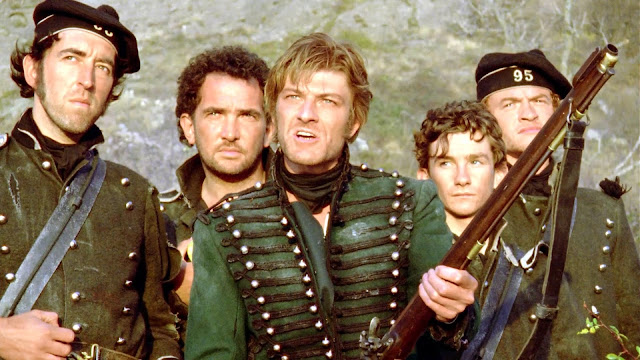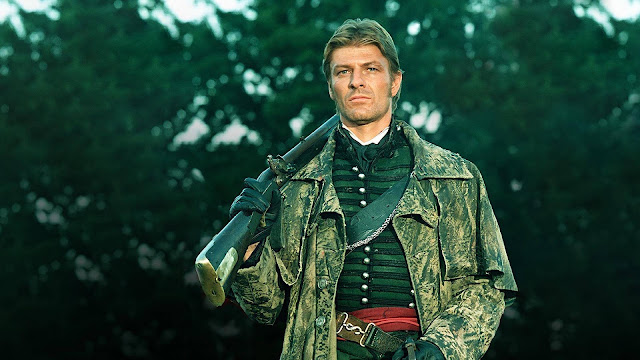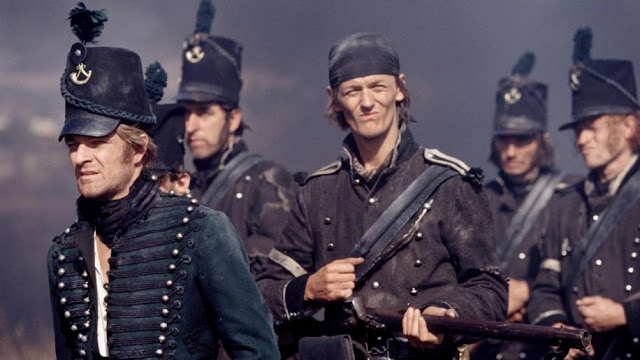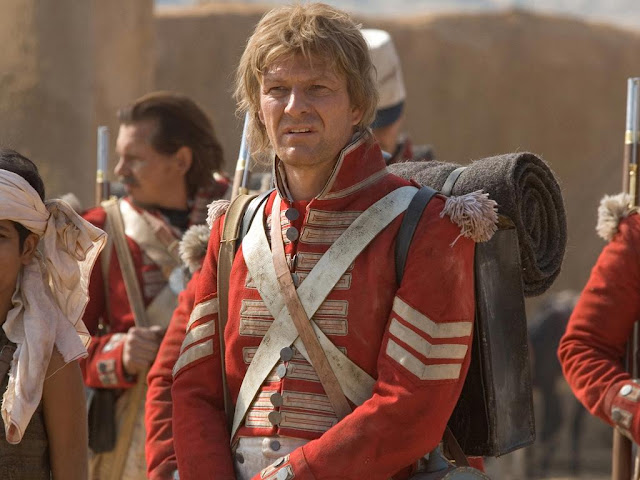Classic TV: Sharpe
Based on the novels by Bernard Cornwell, the TV series Sharpe provided Sean Bean with his most famous role as Richard Sharpe, a British army officer fighting against the French during the Napoleonic Wars. The series followed Sharpe's wartime exploits across 14 feature-length television films, originally broadcast between 1993 and 1997. These were followed by two additional two-part stories set in India and broadcast in 2006 and 2008.
Sharpe is initially encountered in the first film in the series, Sharpe's Rifles, as a humble sergeant, part of a British army fighting Napoleon in the Peninsula campaign in Portugal and Spain. When the British General Arthur Wellesley, the Duke of Wellington (David Troughton), is caught in an ambush by French cavalry, Sergeant Sharpe comes to the rescue and saves Wellington's life. As a reward, Wellington gives Sharpe a field commission. The working class Sharpe is now an officer and a gentlemen - well, an officer at least - and as Lieutenant Sharpe is given command of his own unit of riflemen.
Sharpe finds he is initially resented by both his men, who want a "real" officer, and by his fellow officers, who regard him as a lowly ruffian. He must first win over his own soldiers - in particular, the recalcitrant Irishman Harper (Daragh O'Malley), who is the most implacably hostile - before proving his mettle to the sneering officer class who think him beneath them.
 |
| Sean Bean as Richard Sharpe |
Gradually Sharpe's men warm to him, and come to respect him as both a soldier and a leader. The initially hostile Harper becomes Sharpe's trusted sidekick and is promoted to sergeant. The subsequent adventures of Sharpe and his men take them through the Peninsula campaign, the British advance into France and then to Napoleon's rout at the Battle of Waterloo in 1815, by which time Sharpe has been promoted to lieutenant colonel.
Sharpe was an unlikely success story in the British TV landscape of the 1990s. This was an era dominated by detectives, hospital dramas and the first stirrings of "reality" TV. In contrast, with its stirring tales of men fighting for king and country and its celebration of courage, loyalty and duty, Sharpe had literally arrived from another age. But Bernard Cornwell's series of novels, and the TV series they inspired, were a popular success, and Richard Sharpe became the most enduring role of the star of the TV version, Sean Bean.
Bernard Cornwell was a former TV news and current affairs producer, who had moved to the US after marrying an American woman. Finding himself unable to work without a green card, he tried his hand at writing fiction, beginning with the novel Sharpe's Eagle in 1981.
The TV series arrived just over a decade later and was produced by Malcolm Craddock and former ITV executive Muir Sutherland through Celtic and Picture Palace Productions. All of the films were directed by Tom Clegg, a veteran of filmed television series for ITV, most notably on the crime series The Sweeney, as well as the second Sweeney feature film spin-off.
The series most regularly used scriptwriters were Eogan Harris and the playwright Charles Wood, a specialist on military subjects - although other writers were employed, including Quatermass creator Nigel Kneale, who wrote just one episode.
 |
| Sharpe with some of his men, including Harper (Daragh O'Malley, 2nd left) |
McGann was then replaced mid-filming by Sean Bean, a rising British TV star of the time. The same year as Sharpe was first broadcast, Bean also played the gamekeeper Mellors opposite Joely Richardson in Lady Chatterley, a high profile TV adaptation of Lady Chatterley's Lover directed by Ken Russell. Bean had already appeared in a few feature films as well; Caravaggio (1986), Stormy Monday (1987), Windprints (1989), The Field (1990), and the Jack Ryan thriller Patriot Games (1992) opposite Harrison Ford.
It's a little difficult to imagine the softly-spoken Paul McGann playing Richard Sharpe, so maybe this casting change was for the best. Sean Bean certainly made the part his own and his swagger and dash helped to win over viewers who wouldn't normally be interested in watching a military drama about the Napoleonic Wars.
 |
| Sharpe in a heroic pose |
Sharpe may be an officer and a leader of men, but he is still working class at heart. He is down to earth, vaguely roguish, still a bit rough around the edges, and doesn't always behave in the gentlemanly way his opponents expect. While he is obviously uncomfortable in formal society situations, he still has enough appeal to win over some of the series leading ladies.
The series presents unashamedly old-fashioned, swashbuckling adventures with mostly quite traditional values of martial heroics, courage, loyalty and duty, but its class consciousness helps it to appeal to a modern audience. Sharpe's rough edges and obvious discomfiture in high society, because of his background and lack of schooling, also means that he is not too perfect a hero for audiences to root for.
The series is ambitious for its time and the production values on Sharpe are good for a 1990s TV series. The crew made extensive use of locations, mostly in Crimea, but also in Turkey, Portugal, Spain and, occasionally, back on home turf in England. The TV budgets could never stretch to the numbers of soldiers required for some of the books' grand battle scenes, but the series covers for this reasonably well by carefully marshalling its resources.
Filming in Crimea, in the former Soviet Union as it was disintegrating in the early 1990s, helped to keep the costs down, but it was a challenging experience. The early films, in particular, were almost legendarily difficult shoots, with some of the cast vowing not to return for subsequent instalments.
 |
| Mr and Mrs Sharpe: Sean Bean as Sharpe with Abigail Cruttenden as Jane |
Sharpe's unit are riflemen and so wear dark green tunics, instead of the more famous and distinctive British Army red, and their rifles are far more accurate than the standard issue muskets of the period. This allows the series to present a version of warfare more familiar to modern audiences and more conducive to adventure stories than traditional 19th century set piece battles.
Brian Cox also appeared as Major Hogan, Wellington's aide and spy, in the first two films, but not thereafter. The difficult shoot in Ukraine on the early films was miserable enough that Brian Cox decided not to return, explaining why his character is absent from the rest of the series.
As well as Daragh O'Malley as Harper, Sharpe's men were formed around a core of regular characters. Among them were John Tams as Hagman, Jason Salkey as Harris and Michael Mears as Cooper. Jason Salkey later wrote a book, From Crimea with Love: Misadventures in the Making of Sharpe's Rifles, detailing the cast and crew's experiences on the series.
As well as acting in the series, John Tams co-wrote the music with Dominic Muldowney, and sang the end title song "Over the Hills and Far Away". Historical re-enactor Richard Moore, who acted as an adviser on the series, can also often be seen among Sharpe's men.
 |
| Sharpe leading his men into action. And actually wearing his hat. |
Other recurring characters included Sharpe's initial love interest, Teresa (Assumpta Serna), a Spanish guerrilla fighting against the French, and later his flighty and troublesome wife Jane, played by Abigail Cruttenden, who would become Sean Bean's own wife for a few years.
Sharpe's regular antagonists included Michael Cochrane as the corrupt and tyrannical officer Simmerson, and Pete Postlethwaite, as the memorably crazed and villainous Sergeant Hakeswill in the episodes Sharpe's Company and Sharpe's Enemy. On the French side, the spy Ducos (Feodor Atkine) also puts in a few appearances, notably in Sharpe's Honour and Sharpe's Revenge.
The series guest actors offer some impressive before-they-were-famous star-spotting. Sharpe's Eagle features future James Bond star Daniel Craig, together with Neil Dudgeon of Midsomer Murders, as two twerpish, upper class officers. Mark Strong plays Colonel Brand, a supposedly heroic but actually very shady officer, in Sharpe's Mission. Jason Durr is an inexperienced commander of troublesome soldiers in Sharpe's Battle and Paul Bettany plays the reckless and incompetent Prince of Orange in Sharpe's Waterloo.
Sharpe's return to England in Sharpe's Justice features Philip Glenister as a labour organiser and Douglas Henshall as an arrogant young officer in the local yeomanry. The series traditional damsels in distress include Liz Hurley in Sharpe's Enemy and Emily Mortimer in Sharpe's Sword.
Downton Abbey creator Julian Fellowes appears as a major in Sharpe's Rifles and then as the Prince Regent three years later in Sharpe's Regiment. The Prince, absurdly, convinces himself that he has fought on the battlefield with Sharpe and waxes lyrical about their adventures together. This is something that Sharpe has to indulge - although he later turns the situation to his advantage.
 |
| Sergeant Sharpe in a flashback scene |
Sharpe is not an ideal candidate for binge-watching as, in its middle period in particular, the series does settle comfortably into formula. Sharpe has to lead his men on a dangerous mission, usually into enemy territory. In doing so, he has to deal not only with the French, but also with his own incompetent senior officers - usually while rescuing a simpering damsel along the way.
Some episodes do offer a change to the established formula. In Sharpe's Regiment Sharpe and Harper return to England and go undercover as new recruits to expose a corruption scandal involving a phantom regiment.
Sharpe's Justice is an original story, not based on the books, and seemingly partly inspired by the 1819 Peterloo Massacre. The story finds Sharpe returning to England to lead a local yeomanry in Yorkshire in the period of peace between Napoleon's first exile and the Battle of Waterloo. Here he finds himself caught between the local industrialists he is meant to be protecting and the downtrodden workers who are fighting for better conditions.
The most unlikely instalment in the series is probably the Nigel Kneale-scripted Sharpe's Gold, where Sharpe and his men battle guerrillas who believe they are descended from Aztecs.
After 14 films the series ended with Sharpe's Waterloo in 1997, which ambitiously portrayed our hero's involvement in the epic battle of 1815. Sharpe is initially acting as an aide to the Prince of Orange, before becoming involved in the pivotal fighting around the farmhouse at La Haye Saint.
After almost a decade away, the series returned for two 2-part specials. Sharpe's Challenge appeared in 2006 and was followed in 2008 by Sharpe's Peril. Both were set in India and used elements of earlier Cornwell Sharpe novels. They also included a flashback to Sharpe's days as a sergeant in India before he served in Europe. These novels were set before Sharpe became an officer, so the stories had to be reconfigured for the TV series so that they could follow on chronologically from the previous fourteen instalments.
Sharpe's Challenge casts Toby Stephens as its principle villain and features Peter-Hugo Daly as Hakeswill substitute Sergeant Bickerstaff. Daly had previously played a different shady sergeant in Sharpe's Gold.
Sharpe's Challenge was originally broadcast in two 71 minute episodes, but was also cut down into a feature length TV film of 110 minutes. Sharpe's Peril was also originally shown as two 71 minute episodes, with a 100 minute feature length version also available. Sharpe's Challenge is the best of these two-parters and marks a welcome return for the character. The last story, Sharpe's Peril, is a competent re-run, but doesn't offer anything all that new.
For those who enjoyed Sharpe, its successor, the naval adventure Hornblower (shown on A&E in the US as Horatio Hornblower), is an easy recommendation. This series was first broadcast the year after Sharpe ended its original run, and starred Ioan Gruffud as C.S. Forester's title character. Hornblower was originally developed by the makers of Sharpe and later instalments featured a prominent role for the original Sharpe, Paul McGann. Like Sharpe, the series ran in a two hour time slot on ITV, but ended after an eight episode run in 2003.


One of my all-time favorite TV shows. We just rewatched them all a few months ago. Loved them still as much as I used too. I don't know one girl who didn't have a serious crush on Sean Bean. And you don't get "Over the Hills and Far Away" out of your head once you've heard it.
ReplyDeleteI also loved Major Hogan and the first Duke of Wellington.
Sharpe's wife Jane was a bit of a problem, but then I'm not sure her character arc was really well-written. The strange turn her character took, from loyal wife to not only faithless but utterly vicious and murderous (as far as I remember) woman was a bit odd.
The only episode that wasn't so great was Sharpe's Gold. The Aztec angle just doesn't feel right.
The two episodes set in India were OK. The biggest problem was that Bean looked quite a good bit older. I guess his lifestyle was already beginning to catch up with him.
It's hard to imagine anyone other than Bean in this role, though I really liked Paul McGann in the Hornblower show, which I also like a lot.
Merry Christmas to you
(Margot Shelby, I can't sign in)
And merry Christmas to you. ;)
DeleteSharpe's wife could probably be handled better as a character. She does pivot quite quickly and it's a slight problem. We could assume this was partly the result of her being influenced by her new man and maybe she was always fairly impressionable.
Sharpe's Gold is probably the weakest. It disappoints me that this was Nigel Kneale's contribution.
I like Paul McGann in Hornblower too, but it's difficult to imagine him as Sharpe. He'd recently worked with the producers on a film, so this is probably why they thought of him. But he and Sean Bean are such different actors. McGann is much more thoughtful, quiet even. I can almost picture him playing the role, but it would have changed the whole series and given it a different flavour.
This is one of my favorite TV shows. Its scenes are very good. I think ye very good tv show.
ReplyDeleteI had a big problem with the lack of continuity. Bayonets off, then on, then off again during the same charge. Sharpe being seriously injured and miraculously recovering. That was disappointing because the books are fun to read.
ReplyDelete